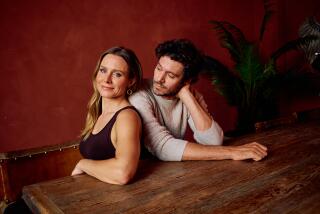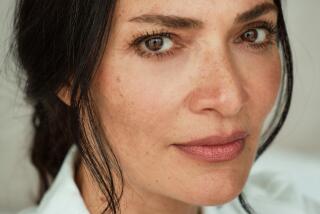Infidelity Incites Rage, Psychologist Testifies at Broderick Trial
- Share via
A woman whose husband cheats on her is a “victim” who, driven by the “infidel” man’s lies, typically sinks into stages of rage and can erupt in a “sudden and explosive reality,” a psychologist testified Monday at Elisabeth Anne (Betty) Broderick’s double-murder trial.
The psychologist, an expert in infidelity, said a woman suffers from a “cold rage” when she suspects an affair, which blossoms into a “hot rage” when she finds out for sure. The affair turns the woman into an “uncapped volcano of pain” whose “very fabric of life” is torn apart, the psychologist said.
Frequently, the woman, who “feels crazy” because she has been “utterly, totally betrayed,” becomes suicidal or threatens violence against her husband, psychologist Don David Lusterman said.
But what she really wants, he said, is just to talk to her husband, even if she doesn’t get that chance until years after the affair, because, typically, she must “look toward the perpetrator of that pain for the resolution of that pain,” he said.
Betty Broderick brushed away tears as she listened Monday morning--a year to the day after she shot her ex-husband and his new wife--to Lusterman’s description.
She testified last week in her own defense that she shot attorney Daniel T. Broderick III and Linda Kolkena Broderick after creeping into his house, seeking just to talk to him and, if that failed, to kill herself.
Daniel Broderick, 44, was a prominent medical malpractice attorney and a former president of the San Diego County Bar Assn. Linda Kolkena Broderick, 28, was his office assistant.
After 16 years of marriage, Daniel and Betty Broderick separated in 1985, about two years after Daniel Broderick began an affair with Kolkena, an affair he confirmed later in 1985, according to court testimony.
During a bitter divorce, which took four years to conclude, Betty Broderick accused Daniel Broderick of using his legal influence to cheat her out of her fair share of his seven-figure annual income.
By the time she stole into her ex-husband’s house, Betty Broderick said last week, she felt like an “electrified crazy person.” Her defense attorney, Jack Earley, contends that she did not have the premeditation the law requires for first-degree murder because she did not intend to kill anyone but herself last Nov. 5.
Lusterman, a Long Island psychologist, testified Monday--as a defense witness--that he knew very little about the Broderick murder case or about the Broderick divorce, saying he had not read court transcripts or even press accounts of either case. He also said he had never treated anyone who had killed a spouse after a revelation of infidelity.
He talked only in general terms Monday, not relating any of his expertise to the Broderick divorce. But, he said, without an expression of remorse from the husband about the affair, virtually everything the husband does can be added to the “pressure cooker” that the wife becomes.
Betty Broderick testified that, when she suspected an affair, Daniel Broderick denied it and suggested she was mentally ill. That suggestion is a common one related by a cheating husband to a wife, Lusterman said.
When the affair is confirmed, the woman--usually the victim, according to Lusterman--feels “utterly, totally betrayed,” he said. “Everything she has been told has been called into question” by the husband’s repeated denials, since “every day has been filled with lies,” he said.
Suffering from a “very, very deep wound,” the woman “tends to blame everyone,” he said.
Several of Betty Broderick’s friends testified later Monday that she blamed everyone and everything for the divorce.
“Betty felt that she was a victim of the legal system,” said Marilyn Olson, a longtime friend. “But that’s the whole story, isn’t it?”
Lusterman also said that, when the ex-husband goes on to a new life, the former wife still can feel “canceled, left high and dry.”
Olson said Betty Broderick went through a “series of changes” during the divorce battle that she “would characterize as a loss of control, depression, acting out, panic.”
Before the split, Anne Dick, another Broderick friend said, Betty Broderick was an “enormously energetic person.” After 1985, said Melanie Cohrs, Betty Broderick “gained a lot of weight” and “didn’t seem to care as much about her appearance.”
Before 1985, Dick said, Betty Broderick was “the consummate mother.” But, according to testimony in the trial’s previous two weeks, she gave all four of the couple’s children to Daniel Broderick shortly after they separated, saying she wanted him to get “more involved” in rearing the children.
Lusterman said that, if there are children in a splitting marriage, they are used as pawns in the struggle, delivering messages back and forth between the parents and often enduring emotional outbursts from the mother, who commonly becomes “very ineffectual as a parent.”
In 1987, Betty Broderick even had a conversation with one of her children--one of her two sons, who was then 11--where she repeatedly called her ex-husband sexually explicit names, according to trial testimony. Suffering from “utter betrayal” from the father, a mother “can be unthinkingly cruel to their children,” Lusterman said.
“The children get put in the line of fire, like (Iraqi ruler) Saddam Hussein taking his hostages and putting them in the line of fire at strategic points,” Lusterman said.
The trial is scheduled to resume today with defense lawyer Earley presenting more witnesses.
Earley said he expects his case to conclude later this week and for the trial to go to the jury next week.
More to Read
Sign up for Essential California
The most important California stories and recommendations in your inbox every morning.
You may occasionally receive promotional content from the Los Angeles Times.













